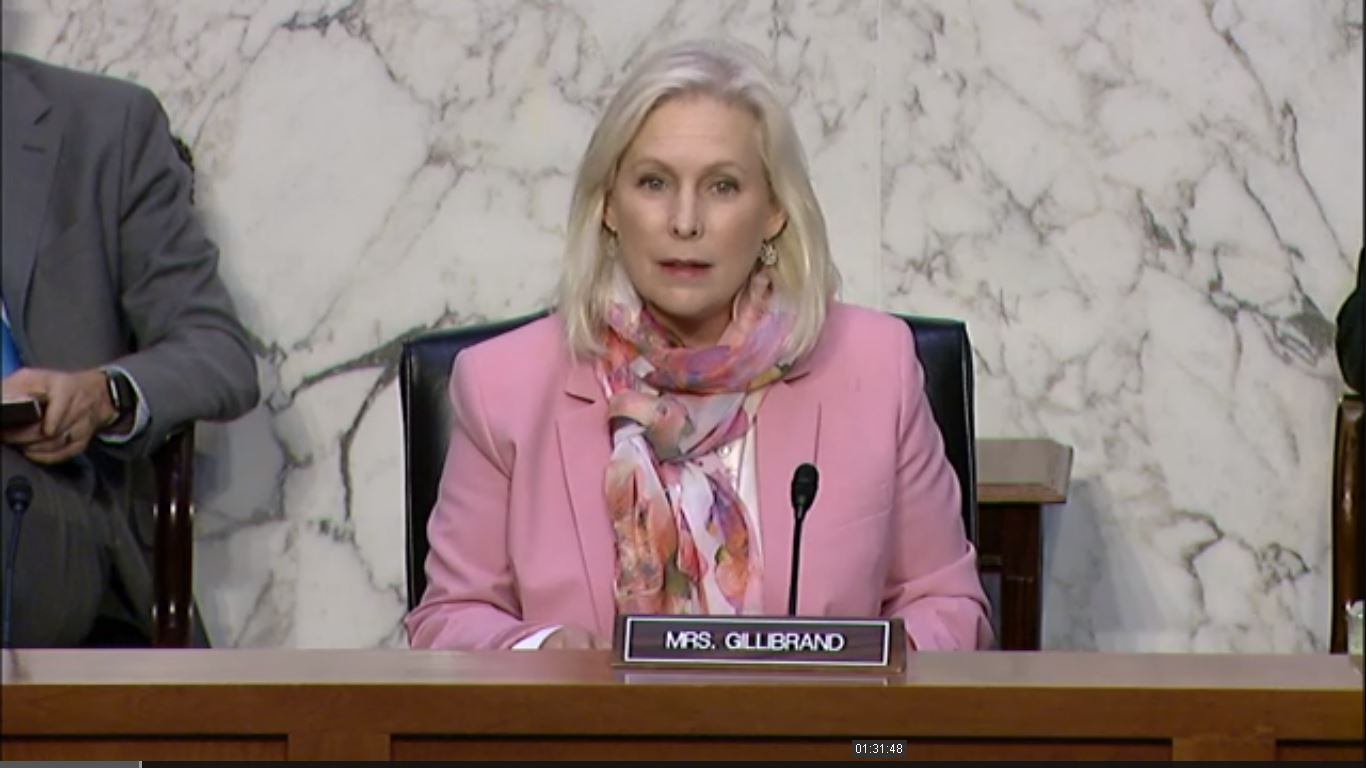A senator who has been pushing defense officials for years to root out sexual assault and harassment in the ranks said she was “baffled” and “exasperated” by a defense official’s testimony that DoD doesn’t have visibility over what’s happening on the ground at units and installations with these issues.
“Isn’t that the unit commander’s job?” asked Sen. Kirsten Gillibrand, D-N.Y., during a hearing of the personnel panel of the Senate Armed Services Committee May 12. Gillibrand, who is chairwoman of the panel, has pushed to remove sexual misconduct cases from the traditional military chain of command. She pointed out that DoD has maintained for years that commanders should keep that authority.
This year, a bipartisan congressional proposal led by Gillibrand —which would remove that authority from the chain of command and instead establish an independent counsel’s office to oversee the cases — has gained support.
Gillibrand’s questions were prompted by testimony by Elizabeth Van Winkle, whose responsibilities include advising personnel officials and the Secretary of Defense on developing policies, providing oversight, and integrating activities in the areas of sexual assault prevention and response.
Van Winkle said Pentagon officials haven’t had a clear picture of what’s going on within units in terms of how sexual assault and harassment are being addressed.
“We’re looking at all aspects of these issues to shed light where we previously didn’t have visibility,” said Van Winkle, executive director of DoD’s Office of Force Resiliency, in her testimony before the subcommittee. If officials don’t have that visibility at the unit and installation level, Van Winkle said, “then we simply don’t have a good sense of whether our initiatives are getting to where they need to be.”
Gillibrand said she was “exasperated” by that statement, noting that commanders have had this authority at the unit level. “So for you to state there’s no visibility there, is an absurd statement. You have visibility because you have unit commanders,” she said.
“You’ve had testimony from survivors in the last eight years I’ve been working on this that when they are sexually harassed, 66 percent of the time it comes from their unit commander. So you’ve had plenty of visibility onto this issue. …
“What’s invalid about the information you’ve been getting from service members ….. direct testimony saying they’re being harassed, direct testimony that when they do come forward with a sexual assault report that they are retaliated against?” Gillibrand asked.
“It’s not that that’s invalid, it’s that we didn’t know where it was happening,” Van Winkle said.
In terms of broader policies and programs, Van Winkle said, she wants to make sure that DoD also has visibility in situations where victims don’t feel comfortable coming forward, so that officials can intervene in those situations.
She said the issue was illustrated by the Fort Hood report, detailing problems with the command climate, among other issues. “Many of the immediate actions the [Secretary of Defense Lloyd Austin] has recently directed are to get just at that, what is happening on the ground. So we can intervene early and prevent these behaviors from happening.”
Following an alarming number of murders, suicides, sexual assaults and incidents of harassment at Fort Hood, an independent committee conducted a review of the command climate there. The committee determined there was an environment at Fort Hood that allowed sexual assault and harassment to proliferate. In December, Army officials relieved or suspended 14 leaders at Fort Hood.
“Military sexual assault is a big problem,” Sen. Thom Tillis, R-N.C., told the services’ personnel chiefs who also testified. “We hear some of the programs we expected to be implement on the ground haven’t been. You’re the leaders. It comes from the top first. We expect to see a lot of progress.”
Gillibrand said the military has more data about these incidents than any district attorney’s office has, because the services conduct annual surveys, and have reporting requirements. “This is supposed to be something the command has taken seriously, with zero tolerance for the last decade,” she said.
“It’s not lack of visibility. It’s not lack of information,” she said.
“It’s lack of will.”
Gillibrand asked Van Winkle to “rework your testimony. What you’ve said here is unbelievable.”
Deputy editor Leo Shane contributed to this report.
Karen has covered military families, quality of life and consumer issues for Military Times for more than 30 years, and is co-author of a chapter on media coverage of military families in the book "A Battle Plan for Supporting Military Families." She previously worked for newspapers in Guam, Norfolk, Jacksonville, Fla., and Athens, Ga.




